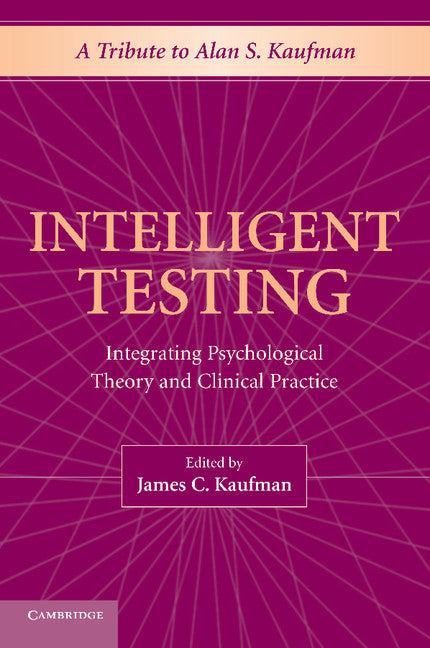Freshly Printed - allow 6 days lead
Couldn't load pickup availability
Intelligent Testing
Integrating Psychological Theory and Clinical Practice
This tribute to Alan S. Kaufman is edited by his son James, with contributions by a 'who's who' in IQ testing.
James C. Kaufman (Edited by)
9781107423558, Cambridge University Press
Paperback / softback, published 11 September 2014
264 pages, 4 b/w illus. 2 tables
23 x 15.3 x 1.4 cm, 0.39 kg
"...Overall, the book may serve different purposes for different people. For those who were not around during the release of the book Intelligent Testing with the WISC-R (Kaufman, 1979), it may fill in a few knowledge gaps and provide some context to the current state of test interpretation. For others who have been involved in individual psychological assessment during the late 1970s through now, some of it may read like a trip down memory lane... The ideas in this book may serve as a point from which others may build, whether those ideas come directly from Professor Kaufman or from the impressive list of contributors. Readers of this book should come away with an appreciation of how Kaufman has moved the field of applied psychology forward in a constructive manner... the tribute is well deserved."
—Matthew R. Reynolds, University of Kansas, Journal of Psychoeducational Assessment
The field of intelligence testing has been revolutionized by Alan S. Kaufman. He developed the Wechsler Intelligence Scale for Children–Revised (WISC-R) with David Wechsler, and his best-selling book, Intelligent Testing with the WISC-R, introduced the phrase 'intelligent testing'. Kaufman, with his wife, Nadeen, then created his own series of tests: the Kaufman Assessment Battery for Children (K-ABC), the Kaufman Test of Educational Achievement (K-TEA), the Kaufman Brief Intelligence Test (K-BIT), and many others. The K-ABC, the first major intelligence test to challenge the Wechsler, helped raise the bar for future tests. This is a celebration of his life's work, with contributions by a 'who's who' in IQ testing, including Bruce Bracken, Dawn Flanagan, Elaine Fletcher-Janzen, Randy Kamphaus, Nancy Mather, Steve McCallum, Jack Naglieri, Tom Oakland, Cecil Reynolds, and Robert Sternberg, is edited by his son James, and features essays expanding on his work and ideas from former colleagues.
Part I. Those Who Know Him: 1. Alan S. Kaufman's contributions Nadeen L. Kaufman
2. Who is Alan S. Kaufman? Elizabeth O. Lichtenberger
3. Alan S. Kaufman: the man and the professional Jennie Kaufman Singer
Part II. Intelligent Testing: 4. Intelligent testing: bridging the gap between Classical and Romantic science in assessment Elaine Fletcher-Janzen
5. The intelligent testing of children with specific learning disabilities Nancy Mather
6. Temperament preferences for children ages 8 through 17 in a nationally represented sample Kyle Bassett and Thomas Oakland
7. Intelligent intelligence testing: the influence of Alan S. Kaufman Jack A. Naglieri
Part III. The Intersection of Theory and Measurement: 8. Kaufman on theory, measurement, interpretation, and fairness: a legacy in training, practice, and research Samuel O. Ortiz and Dawn P. Flanagan
9. The theory of successful intelligence as a basis for new forms of ability testing at the high school, college, and graduate school levels Robert J. Sternberg
10. Kaufman's work in the penumbra between measurement science and clinical assessment Randy W. Kamphaus and Cecil R. Reynolds
11. Success is a latent variable: how Alan Kaufman shaped intelligence test theory, interpretation, and psychometrics with factor analysis Jason C. Cole
Part IV. Kaufman Across the World: 12. The K-ABC in France Claire Énéa-Drapeau and Michèle Carlier
13. Dr. Alan Kaufman's contribution to Japan: K-ABC, intelligent testing, and school psychology Toshinori Ishikuma
14. Alan Kaufman's deep influence in Sweden Jan Alm
15. Intelligent testing of underserved populations R. Steve McCallum and Bruce A. Bracken.
Subject Areas: Educational psychology [JNC], Psychological testing & measurement [JMBT]


